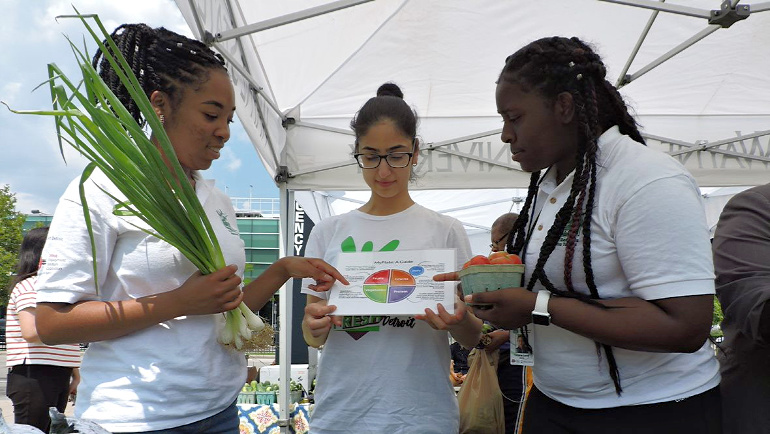
The Wayne State University Community Health Pipeline (CHP) is partnering with the university’s C2 Pipeline program to provide a “Food Ambassador” day camp for youth within Detroit and the surrounding metro area. The WSU College of Nursing’s C2 Pipeline is a 21st Century Community Learning Centers Grant program funded through the Michigan Department of Education, and the CHP is funded by the Michigan Health Endowment Fund. The collaboration will expand the C2 Pipeline STEM day camp offerings, and youth will learn about the Detroit food system over the course of the week by visiting local organizations and gaining skills in nutrition, culinary arts, advocacy and community health. The CHP plans to host approximately 100 students in these camp sessions throughout the summer.
Each day of the camp is themed: nutrition, food access, food in the D, food production and advocacy. Food Ambassadors will explore how personal attitudes and resources, relationships, the community, and policy all influence what we eat. They will compete in a Nutrition Amazing Race, visit Eastern Market and urban farms, learn about the Double Up Food Bucks program, test their taste buds in identifying organic produce, employ their Food Ambassador skills at the Wayne State University Farmers Market, and practice culinary skills by creating a celebratory community meal. Youth will also hear from current college students and have the opportunity to ask questions to aid them in their career exploration.
“The Food Ambassador program aligns perfectly with our goal of exposure for our students in the areas of STEM and health, and has a focus that none of our other programs has,” said Don Neal, C2 Pipeline principal investigator and project director. “We are truly excited about this opportunity.”
“Funding from the Michigan Health Endowment Fund has allowed us to expand our established community health programming and partner with another key youth-serving and college preparatory program — a win for youth in Detroit and surrounding areas, and a win for Wayne State University,” said Noel Kulik, Ph.D., CHP project director and associate professor in kinesiology, health and sport studies.
Current high school students in metro Detroit are eligible to attend the camp to become a Food Ambassador. Camp is free, and it includes lunch and transportation to Wayne State University. Registration is open at c2pipeline.wayne.edu/summer. To receive a scholarship, email the CHP program manager at chp@wayne.edu with the student’s name and the week they have registered for the camp.
Summer 2019 is the third year of the Community Health Pipeline, which was developed and is directed by Kulik, who is an associate professor in the College of Education and a research fellow in the Center for Health and Community Impact. The Community Health Pipeline works to provide a career development pipeline to support Detroit high school youth to enter college, obtain well-paying jobs, and change the health, economic, and social trajectories of their communities.
The Community Health Pipeline includes five pillars — education, urban farming, apprenticeships, youth empowerment and career development — that build upon each other. The day camps tie these components together in a comprehensive one-week experience. In 2020, a residential summer camp option will also be offered for those hoping to hone their Food Ambassador skills. Both the CHP and the Food Ambassador camps are funded by the Michigan Health Endowment Fund.
For more information about the Community Health Pipeline, contact Stephanie Osborn, project manager, at 313-577-0390 or chp@wayne.edu, or visit coe.wayne.edu/centerforhealthandcommunityimpact/community-health-career-pipeline.php.
About the Center for Health and Community Impact
The mission of the Center for Health and Community Impact is to improve community health and vitality through leadership and advancement of research, programs and policies for healthy living. The center works with community partners to develop and lead culturally relevant, evidence-based and sustainable programs that transform the healthy living opportunities for families, neighborhoods and organizations to promote a holistic approach to health and social equity across the lifespan. Through its efforts, educators, clinicians, practitioners, evaluators, researchers and community leaders at Wayne State University advance health and social equity at local, regional and national levels. The center’s programs have directly impacted more than 150,000 youth and families and 500 educators and health practitioners across 350 community organizations. For more information, visit coe.wayne.edu/centerforhealthandcommunityimpact.
About the College of Education
For more than a century, the Wayne State University College of Education has prepared effective urban educators who are reflective, innovative and committed to diversity. Its Teacher Education Division boasts one of the most comprehensive, well-established programs in the country, and all four academic divisions offer a range of undergraduate and graduate degrees in nearly 30 program areas, including learning design and technology, leadership and policy, kinesiology, sport administration, education evaluation and research, health education and educational psychology, and counseling. To learn more, visit coe.wayne.edu.
About Wayne State University
Wayne State University is a premier urban research institution of higher education offering nearly 350 academic programs through 13 schools and colleges to more than 27,000 students. For more information, visit wayne.edu.
About the Michigan Health Endowment Fund
The Michigan Health Endowment Fund works to improve the health and wellness of Michigan residents and reduce the cost of health care, with a special focus on children and seniors. More information about the Michigan Health Endowment Fund can be found at mhealthfund.com.
About the C2 Pipeline
C2 Pipeline is a Wayne State University College of Nursing program that has been awarded AdvancED STEM Certification. The program is funded by a 21st Century Community Learning Centers Grant through the Michigan Department of Education.
